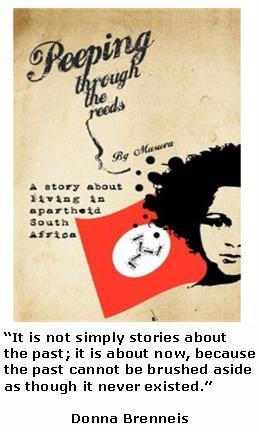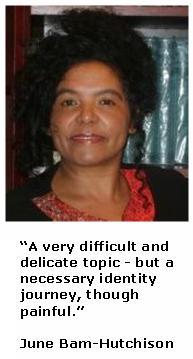 ReConnect Africa is a unique website and online magazine for the African professional in the Diaspora. Packed with
essential information about careers, business and jobs, ReConnect Africa keeps you connected to the best of Africa.
ReConnect Africa is a unique website and online magazine for the African professional in the Diaspora. Packed with
essential information about careers, business and jobs, ReConnect Africa keeps you connected to the best of Africa.


 US writer, poet and activist, Donna Brenneis, presents an insightful and compassionate analysis of a moving new book on living in apartheid South Africa
US writer, poet and activist, Donna Brenneis, presents an insightful and compassionate analysis of a moving new book on living in apartheid South Africa
"Peeping through the Reeds" by South African Dr. June Hutchison (pen name Musuva) provides the reader with real events that are not universally known; generally, these stories do not pop up in our kitchen table discussions.
Musuva's book is highly recommended for its compass-like qualities that serve the global communities and history of the Griqua people and coloured oppression that remains an issue in South Africa despite the fact that we are more interconnected with each other at a fundamental level than ever previously believed.
In 1994 the first free multiracial elections were held in South Africa, but there is still the need for an "ongoing healing project for South Africans today" after seventeen years. If we, in fact, "are born to be our brother's keeper" "Peeping through the Reeds" will not only help South Africans realize how this can be best accomplished; it will help the global community with the complex issues that individuals face in today's mosaic world. South Africa is not a stereotype when it comes to segregation and race issues. It is the archetype.
When Archbishop Desmond Tutu was interviewed by Director Tom Shadyac for the film 'I AM The Documentary' he stated, "The truth of who we are is that we are because we belong."
"Peeping through the Reeds" cries out to the universe to understand that what we do at an individual level affects not only the local but the global environment. Enslavement, segregation under the British and apartheid was in violent juxtaposition to the very core of our well being as was so much of the resultant behaviour of the oppressed. According to one interviewee in Shadyac's documentary "...the basis of all nature is cooperation and democracy. It's in our DNA...."
If you are a reader who is interested in the coping mechanisms of human beings when violence of the soul is thrust upon those who understand interconnection, then reading Musuva's novel is a requisite. Its truth shatters any preconceived notions that might be floating around in our cyber world of inter-connectedness.
Musuva begins her work with a Prologue that immediately shows the violence with which children lived under apartheid and continues within the first chapters. While violence against children in any form is not unknown to the international community, the history of the Griqua people and coloured oppression deserves an audience in order for South Africa's complexities to be understood in 2011, not just during the apartheid regime.
Musuva writes, "We are the Griqua people - the people of the desert plant, named kanniedood, which means 'cannot die'....It grows on the stony mountainsides along the Orange River, its roots clinging to the rocks. They are like our people - resilient and unique, not just to be found anywhere in the world, and wherever they go, they proudly take root in the hardest of places on Earth."
I do not want to give away the novel's intrigue, but it is no coincidence that South Africa's Table Mountain is the oldest in the world. The people to whom Musuva refers will surprise the reader in all likelihood.
What the coloureds (a classification under the pre-rainbow nation) experienced under British segregation and apartheid could only be unique to a community that aspired to Western culture and who were of mixed heritage trying to find their place in a country that told them they could be "white" if they passed the tests.
The book's central thematic question is 'what does it do to one's soul when one denies the true authentic self?'
With the concrete answer that the reader sees in the form of human behaviour, one might think one is looking into the soul of a hope-to-die drug addict. The denial of the authentic self in South Africa resulted in truly schizophrenic and downright crazy making behaviour that could only be understood when faced with insane segregationist realities and the Nazi behaviour of the National Party that took place during the apartheid regime.
Dr. Hutchison's book is not simply stories about the past; it is about now, because the past cannot be brushed aside as though it never existed. There is a collective consciousness and Dr. Hutchison helps us muddle through the complications of South Africa's schizophrenic behaviour that affects not only South Africans, but all of us.
 Dr June Bam-Hutchison is a Community Development Strategist and Diversity Consultant and a Research Associate at the Institute for the Public Understanding of the Past, York University and a Visiting Research Fellow, Faculty of Business and Law, Kingston University.
Dr June Bam-Hutchison is a Community Development Strategist and Diversity Consultant and a Research Associate at the Institute for the Public Understanding of the Past, York University and a Visiting Research Fellow, Faculty of Business and Law, Kingston University.
June Bam-Hutchison grew up on the Cape Flats in South Africa and worked extensively with communities in South Africa during both the apartheid and post-apartheid periods. She has worked at and with a number of universities in both South Africa and Europe, and has presented many talks globally in her field in the area of community, diversity and heritage.
She has held several leadership positions in the field of diversity, heritage and community development, amongst others as CEO of South Africa's first national post-apartheid history project for education which included the establishment of local indigenous knowledge networks and partnerships with communities, local government, higher education and the heritage sector. Recent and present positions include as co-chair of the Mayor's Heritage and Diversity Task Force Committee on Equitable Partnerships in London and as Honorary Secretary of the African Studies Association of the United Kingdom.
June was appointed as a research fellow in human rights and heritage at Kingston University and as community identities research facilitator and advisor with the Institute for the Public Understanding of the Past, York University. Her leadership and contributions was recognized on the world stage in September 2008 with two awards: the 60th anniversary UNESCO Peace Education Prize to South Africa in Paris and a prestigious GG2 UK women in leadership and diversity 10th anniversary award presented to her by the British First Lady in London.
